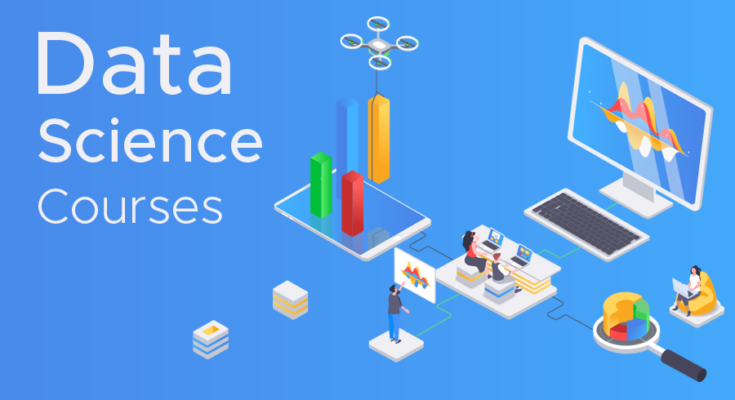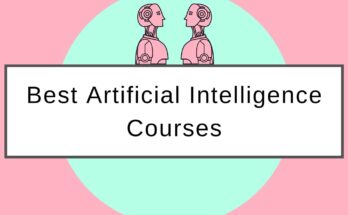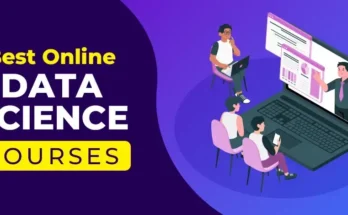With the vast amount of information generated daily, businesses, organizations, and governments are in constant pursuit of experts who can make sense of this data and turn it into valuable insights. If you’re considering a career in data science or want to enhance your data analysis skills, taking a data science course is an excellent step in the right direction. This article will guide you through some of the best data science courses available, including frequently asked questions and a comprehensive conclusion to help you make an informed decision.
Why Data Science?
Before diving into the world of data science courses, it’s essential to understand the significance of data science in today’s landscape. Data science is the multidisciplinary field that combines statistics, computer science, domain knowledge, and business acumen to extract actionable insights from data. Here are some compelling reasons to consider a career in data science:
- High Demand: The demand for data scientists continues to grow, with companies across various industries needing experts to analyze their data and make informed decisions.
- Lucrative Salaries: Data scientists are among the highest-paid professionals in the tech industry. The combination of high demand and specialized skills leads to generous compensation packages.
- Diverse Applications: Data science is used in a wide range of industries, including finance, healthcare, marketing, e-commerce, and more. This versatility allows you to choose a field that aligns with your interests.
- Intellectual Challenge: Data science presents complex problems that require creative and analytical thinking. If you enjoy problem-solving, data science is a rewarding career choice.
Now that we’ve covered why data science is a promising field, let’s explore the best courses available to get you started or take your skills to the next level.
Best Data Science Courses
There are various ways to learn data science, from traditional degree programs to online courses. We’ve curated a list of some of the best data science courses, considering factors like course content, reputation, and flexibility:
1. Coursera’s Data Science Specialization (offered by Johns Hopkins University)
- Platform: Coursera
- Duration: Approximately 6 months
- Cost: Subscription-based, with a 7-day free trial
- Level: Beginner to Intermediate
About: Coursera’s Data Science Specialization is an excellent starting point for aspiring data scientists. This series of courses covers the fundamentals of data science, including data analysis, data visualization, machine learning, and more. The program is led by instructors from Johns Hopkins University, known for their expertise in the field.
What Makes It Great: Coursera offers a flexible learning experience, allowing you to complete the courses at your own pace. The specialization includes practical assignments and projects, ensuring hands-on experience in data science.
2. edX’s Data Science MicroMasters Program (offered by UC Berkeley)
- Platform: edX
- Duration: Approximately 10 months
- Cost: Varies, with the option to audit courses for free
- Level: Intermediate
About: The Data Science MicroMasters Program by UC Berkeley on edX provides a comprehensive understanding of data science, from data analysis and visualization to machine learning and big data. The program is an excellent choice if you’re looking to deepen your knowledge and skills.
What Makes It Great: The MicroMasters Program allows you to earn a certification from a prestigious institution at a fraction of the cost of a traditional degree. You can also apply these credits toward a master’s degree at UC Berkeley.
3. Harvard University’s Data Science Professional Certificate
- Platform: edX
- Duration: Approximately 3 to 6 months
- Cost: Varies, with the option to audit courses for free
- Level: Intermediate to Advanced
About: Harvard University’s Data Science Professional Certificate program is designed for individuals with some background in data science. It covers advanced topics like statistical concepts, machine learning, and data ethics.
What Makes It Great: Harvard’s reputation in academia is reflected in the quality of the courses. This certificate is an excellent way to enhance your data science skills and add Harvard’s name to your resume.
4. DataCamp
- Platform: DataCamp
- Duration: Self-paced
- Cost: Subscription-based, with a 7-day free trial
- Level: Beginner to Intermediate
About: DataCamp offers a wide range of data science courses, from Python and R programming to machine learning and deep learning. The platform is known for its interactive learning experience, which includes coding challenges and real-world projects.
What Makes It Great: DataCamp is highly accessible and affordable, making it an ideal choice for beginners looking to dip their toes into data science.
5. Udacity’s Data Scientist Nanodegree
- Platform: Udacity
- Duration: Approximately 4 to 6 months
- Cost: Subscription-based
- Level: Intermediate
About: Udacity’s Data Scientist Nanodegree program is a project-based learning experience that covers data analysis, machine learning, and deep learning. The curriculum is designed in collaboration with industry experts.
What Makes It Great: The program provides hands-on experience through real-world projects and mentorship, ensuring that you’re job-ready upon completion.
6. Stanford University’s Machine Learning Course (Coursera)
- Platform: Coursera
- Duration: Approximately 11 weeks
- Cost: Subscription-based, with a 7-day free trial
- Level: Intermediate to Advanced
About: Andrew Ng, a renowned figure in the field of machine learning, teaches Stanford University’s Machine Learning course on Coursera. This course is highly focused on machine learning techniques and algorithms.
What Makes It Great: Andrew Ng’s teaching and the depth of the content make this course one of the best for those interested in machine learning. It’s a fantastic resource to understand the core concepts of this subfield.
7. MIT’s Introduction to Deep Learning
- Platform: MIT OpenCourseWare
- Duration: Self-paced
- Cost: Free
- Level: Intermediate to Advanced
About: MIT offers an Introduction to Deep Learning course through its OpenCourseWare platform. It covers deep learning fundamentals and practical applications.
What Makes It Great: It’s MIT, and it’s free. This course is a valuable resource for those who want to explore deep learning without breaking the bank.
8. Data Science Bootcamps (Various Providers)
- Platform: Various, including General Assembly, Springboard, and Metis
- Duration: Typically 12-24 weeks
- Cost: Varies, with some offering income-sharing agreements
- Level: Beginner to Intermediate
About: Data science bootcamps are intensive, short-term programs designed to teach you the essentials of data science and help you transition into the field.
What Makes It Great: Bootcamps offer a fast track into data science and often provide career services to help you find a job in the field. They’re particularly beneficial if you’re looking to make a career change.
Also Read: Professional Consultants Certificate
Frequently Asked Questions (FAQ)
1. What is the difference between a data science course and a data science degree program?
A data science course is a more focused and often shorter program that provides specific skills and knowledge related to data science. It can be a certificate program, a series of online courses, or a bootcamp. Data science courses are an excellent choice if you want to acquire data science skills without committing to a full-degree program.
In contrast, a data science degree program, such as a Master’s or Ph.D. in Data Science, is a more comprehensive and in-depth educational experience. It typically covers a wider range of subjects, including mathematics, statistics, computer science, and domain-specific knowledge. Degree programs are a better choice if you’re looking for a deep understanding of data science and are willing to invest more time and resources.
2. Do I need prior experience to enroll in a data science course?
The prerequisites for data science courses vary depending on the program. Some courses are designed for beginners and assume no prior knowledge, while others may require a background in mathematics, statistics, or programming. It’s essential to review the course description and prerequisites to ensure you’re enrolling in a program that matches your skill level.
3. How long does it take to complete a data science course?
The duration of data science courses varies significantly. Some courses can be completed in a matter of weeks, while others, like degree programs, may take months or even years. It largely depends on the complexity and depth of the course, as well as your personal schedule and how much time you can dedicate to learning.
4. Can I find free data science courses?
Yes, there are free data science courses available. Platforms like Coursera, edX, and MIT OpenCourseWare offer free courses on data science topics. While these courses may not provide the same level of support or certification as paid options, they are an excellent way to get started or enhance your knowledge without any financial commitment.
5. How can I choose the right data science course for me?
Choosing the right data science course involves considering your goals, budget, and current skill level. Here are some steps to help you make an informed decision:
- Define your goals: What do you want to achieve with a data science course? Are you looking to start a career in data science, or do you want to acquire specific skills?
- Assess your budget: Determine how much you’re willing to invest in a course. Keep in mind that paid courses often offer certification and more comprehensive content.
- Check prerequisites: Ensure that the course aligns with your current skill level. Some courses are designed for beginners, while others require prior knowledge.
- Read reviews and testimonials: Research the course’s reputation and read reviews from previous learners to get a sense of the quality and effectiveness of the course.
- Consider flexibility: Some courses are self-paced, while others have set schedules. Choose a format that fits your learning style and schedule.
- Review the curriculum: Examine the course content and make sure it covers the topics and skills you want to learn.
6. Can I earn a data science certification from these courses?
Many data science courses offer certification upon completion. These certificates can be a valuable addition to your resume, demonstrating your commitment to learning and your expertise in data science. However, it’s important to note that the value of a certificate can vary depending on the course provider and its reputation.
7. How do I choose between online and in-person data science courses?
The choice between online and in-person data science courses depends on your preferences, location, and schedule. Online courses offer flexibility, allowing you to learn from anywhere and at your own pace. In-person courses, on the other hand, provide a more structured learning environment and opportunities for networking and face-to-face interaction. Consider your lifestyle and learning style when making this choice.
8. What kind of computer or software do I need for data science courses?
The specific computer and software requirements can vary depending on the course. However, most data science courses require a reasonably powerful computer (laptop or desktop) with internet access. You’ll also need software for data analysis, such as Python or R, and tools for machine learning and data visualization. These requirements are typically outlined in the course materials.
9. Are there any scholarships or financial aid options for data science courses?
Some course providers offer scholarships or financial aid to eligible students. Additionally, you may find external scholarships or grants for data science education. It’s advisable to check the course provider’s website and search for external opportunities to help cover the costs of your education.
10. Can I get a job in data science after completing one of these courses?
Completing a data science course is a significant step toward a career in the field, but it may not guarantee immediate employment. Landing a job in data science often requires building a portfolio of projects, networking, and gaining practical experience. However, these courses can significantly enhance your skills and increase your marketability to potential employers.
Conclusion
The world of data science is teeming with opportunities, and the best way to seize them is by equipping yourself with the right knowledge and skills. Whether you’re a beginner looking to start your journey in data science or an experienced professional seeking to enhance your expertise, there is a data science course tailored to your needs.
In this article, we’ve explored some of the best data science courses, ranging from online platforms like Coursera, edX, and DataCamp to prestigious institutions like Harvard, UC Berkeley, and MIT. We’ve also discussed the pros and cons of various formats, including self-paced online courses and immersive bootcamps.
Ultimately, the best data science course for you will depend on your goals, budget, and current skill level. It’s crucial to research each option thoroughly, read reviews, and consider your personal preferences. Furthermore, keep in mind that pursuing a career in data science is a journey that goes beyond coursework; building a portfolio of projects and networking will be essential in reaching your professional goals.
As the demand for data scientists continues to grow, investing in your education through a data science course is a wise decision. Whether you’re diving into the world of machine learning, deep learning, or data analysis, these courses will provide you with the knowledge and skills needed to thrive in this exciting and rewarding field. Your path to a data-driven future starts with the right course, and this article aims to help you make an informed choice to embark on this transformative journey.




